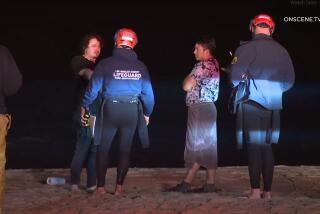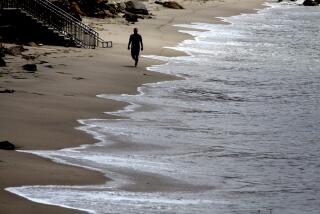Lifeguards clear the waters off San Clemente after spotting 25 sharks — likely great whites — near the shore

A sharks swimming in circling patterns will lead to the beach closing. (May 22, 2017) (Sign up for our free video newsletter here http://bit.ly/2n6VKPR)
Lifeguards in San Clemente ordered swimmers and surfers out of the water Sunday after 25 sharks — some of them 10-footers — were sighted near the shore.
The closure began soon after 10:30 a.m., when a fisherman spotted a shark near the end of the San Clemente Pier, said Nicolas Giugni, one of the coastal city’s marine safety officers.
Before long, he said, two other sharks — likely juvenile great whites — were sighted nearby. By 3 p.m., lifeguards let people back in the water and posted warning signs: “SHARK SIGHTED ENTER AT YOUR OWN RISK.”
But that didn’t last long.
A sheriff’s helicopter did a flyover at 4 p.m., and the crew observed more than two dozen sharks between Cotton’s Point and Capistrano Beach, Giugni said.
Some of the sharks came within 25 yards of the beach and measured as long as 10 feet — a length, he added, that made the decision for another closure an easy call.
Lifeguards look for three things when deciding whether to clear the water: size, behavior and whether the shark has bitten someone or something. Giugni said a shark longer than 8 feet reaches the shut-down threshold, as does a shark swimming in circling patterns, bumping into surfboards or biting.
Although sightings happen at least once a week, Giugni said they’ve closed the water only three times this year. The first closure came after an attack in late April, when a shark tore into the thigh of a woman swimming at a surf spot north of San Onofre State Beach.
Earlier this month at San Onofre, a sheriff’s chopper hovered over the water and blared a scary message to swimmers and paddle boarders: “Attention in the water: This is the Orange County Sheriff’s Department. . . You are paddle boarding next to approximately 15 great white sharks.”
While Giugni described the frequency and concentration of sightings as uncommon, he doesn’t expect things to slow down — the great white shark population, he said, is growing. Chris Lowe, head of the Shark Lab at Cal State Long Beach, has said he partly attributes the increase to better ocean water quality and higher water temperatures.
Despite the increase, Giugni stressed the rarity of attacks. A person is more likely to drown after getting sucked into a rip current, he noted, than die from a shark bite.
“The chances of being bitten or attacked are like winning the Powerball,” he said, pausing for a moment. “But, obviously, people win the Powerball.”
For more news from the Los Angeles County, follow me on Twitter: @marisagerber
ALSO
Sharks are thriving in Southern California but dying in the San Francisco Bay, experts say
‘Attention in the water: ... You are paddleboarding next to ... 15 great white sharks’
He lost a leg to a shark. Now he’s trying to save the species
More to Read
Sign up for Essential California
The most important California stories and recommendations in your inbox every morning.
You may occasionally receive promotional content from the Los Angeles Times.










